Kenyan and Ugandan start-ups make location pay its way
- Published
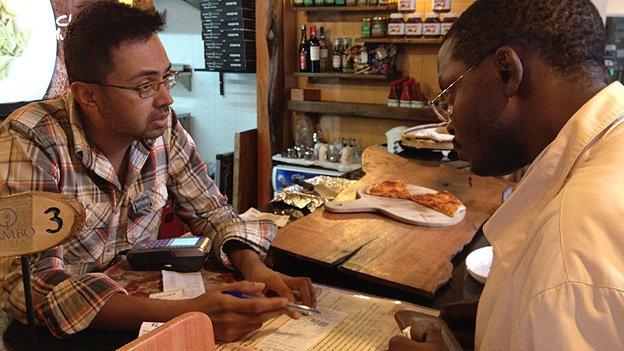
Foursquare for Africa?: Mambo Italia's Nish Shah explains to a customer how to check in using the NikoHapa service using his mobile phone
"If you go to the big supermarkets like Nakumatt, they have smart cards. Of course you are happy to carry Nakumatt's loyalty card - but you're not going to carry mine."
Nish Shah runs Mambo Italia, an outlet located in the airy, baked dough-scented food court of an up-market Nairobi shopping centre.
The Galleria is just one of the malls sprinkled across affluent areas of the city catering to the fast-growing middle class and expatriates.
Competition in the pizza business is fierce, so Mr Shah is now using a service called NikoHapa - Swahili for 'I am here' - that lets users check in on Facebook and Twitter using their mobile phones.
This might sound like Africa's answer to Foursquare - but unlike the smartphone-based location service this works ultimately as a loyalty programme, a subscription service that gives the app's creators a solid means of making money.
The other difference is that you only need to send a text or scan a QR code found on a sticker on your receipt.
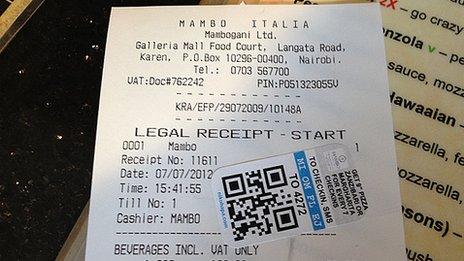
Customers check in by scanning a QR code or by texting a number. This earns loyalty points and checks them in on Facebook and Twitter.
"It's something funky that fits into today's times and that's mobile," says Mr Shah.
"In Kenya, mobile rules."
Upward mobility
The country leads east Africa in terms of mobile usage, <link> <caption>with an estimated 26m subscribers - 67% of the population</caption> <url href="http://www.ihub.co.ke/blog/2012/05/mobile-technology-in-east-africa/" platform="highweb"/> </link> .
The majority of these are basic mobile phones, or feature phones - a halfway house between a smartphone and a basic handset. So apps that work only on smartphones have a limited impact.
Mr Shah is excited about the possibilities.
"It's mobile-based so further down the line we can use the system to push out other offers," he says.
Facebook integration also has benefits.
"Every time you win a pizza it will show up in your timeline. It's free advertising. All of those things are so much better than a smartcard."
At Mambo Italia users get a free 9-inch pizza after seven check-ins.
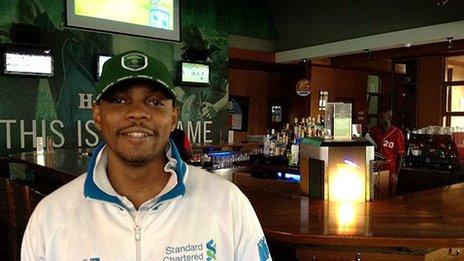
At Blanco's Sports Grill customers choose from seven sporting fixtures - Zawadi Ndapatani says giving local football club shirts is their way of supporting them
Round the corner at Blancos Sports Grill, the first place to use the service, check-ins earn football shirts of local teams and food vouchers.
Manager Zawadi Ndapatani says signing up for the service was a "no brainer".
"We're so dependent on our mobile phones and the smartphone culture is picking up," he says.
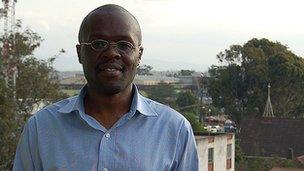
NikoHapa's Bernard Owuor says the service is an engagement platform as well as a loyalty service
"That's where everyone is spending their time. Having this loyalty programme, it goes everywhere that somebody goes. It's flexible, it's cheap and it's easy to use."
Co-founder and chief executive Bernard Owuor says originally they were trying to build a way to send feedback to restaurants and shop owners via text message.
"We thought, why not put in a check-in system, so you can also tell your friends," he says.
"Then we said, why not add an incentive. If you do it 10 times you get a discount. That's how this developed."
The feedback plus customer check-ins can provide useful analytics.
"It's very hard to quantify the monetary value but loyalty programmes work."
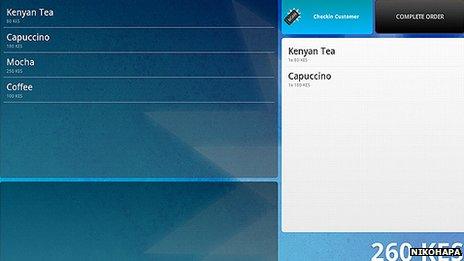
The point of sale app means customers can check in using NFC - the same technology behind the Oyster card in London and Octopus card in Hong Kong
NikoHapa is also an Android phone app, and to encourage check-ins the start-up has just launched an NFC (near field communication) option, as either a card, or key ring fob.
Check-ins are through a special point of sale - or cash register - app that runs on an Android tablet or smartphone.
Mr Owuor says he's already had enquiries from the Ivory Coast and Ghana about launching NikoHapa there.
Fuelled up
Checking-in isn't the only way that location technology is making life easier in east Africa
In the Ugandan capital Kampala, fuel shortages are an everyday occurrence.
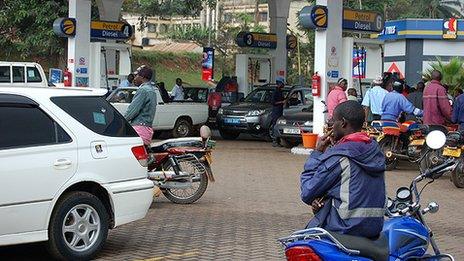
Cars and vans jostle for position while boda bodas - motorcycle taxis - swarm the pumps at one of only two central Kampala petrol stations with fuel
Negotiating traffic and potholes as you drive down roads dyed the rich brick red of the earth, you come across petrol stations that are as empty as their fuel tanks.
Where there is fuel, huge queues of cars and clouds of boda bodas - the ubiquitous motorcycle taxis - descend on the forecourt.

Christine Ampaire (centre) and the team behind Mafuta Go
And with petrol prices spiralling by up to 50% since the beginning of 2012, filling your tank is also costly.
This inspired a group of Makere University students to create an app called Mafuta Go, which shows you where the cheapest petrol is near you. It then tells you how to get there.
"When we released the beta version we had 300 downloads the same day. The traffic was just too much and it crashed," says project manager Christine Ampaire.
"We had to roll back and work on the technical issues."
Fix it they did. It's a simple yet effective idea, and was one of 2012's winners at the prestigious Pivot East mobile app competition.

The latest prices are fed automatically from the app to the MafutaGo twitter stream
Prices are gathered each day by members of the team, crowdsourced by users through the app, or via the Twitter feed where price updates are automatically displayed, and by three boda boda drivers who move around the city.
Users that submit prices earn points, and there are plans to add a check-in loyalty element to the app.
Finding a big supplier to partner with is key to going countrywide, says Ms Ampaire.
"It's still in the early stages but with the attention we're getting, very soon we hope Total, Shell, will give us the prices direct."
The students have formed a company called Codesync, and plan to pour the $10,000 prize money into development.
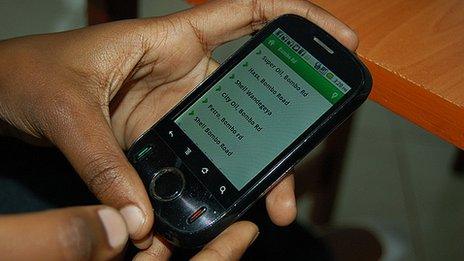
The Mafuta Go app finds your nearest petrol station - and alsos give you information on other services, such as cafes or shops
"Some boda boda drivers and taxis can't easily find this information because they have feature phones, and [don't use] the internet, so they haven't got the chance to know about Mafuta Go.
"We've been seeing how we can put it on SMS so the boda boda driver can [text] a short code, and get the information he needs from us."
Go compare
Location is key to Collins Mugume's fledgling start-up.
"Let's say you're out shopping, you're looking at this product - it's about 500,000 [Ugandan shillings] - you can just pull out your phone, type it in, it will automatically do a search so you can see where you have the best deal.
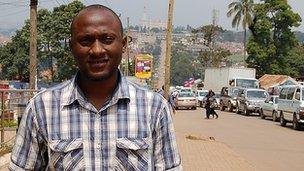
Mr Mugume says the service is available online, as an app and via text message
"With the mobile apps it's much cooler - it will actually give you the distance from where you are to the other stores that stock the item."
Meka - Luganda for "how much" - is Uganda's first retail price comparison app and website. Mr Mugume is busy signing up shops and populating the site, ready to launch at the beginning of August.
The team of four is also working on an app to automatically synchronise stock prices and availability for the bigger stores.
All mapped out
Accurate maps of remote rural areas - and the slums of big cities - can be elusive in Uganda.
So smartphones are being used to map some of the poorest and most far-flung areas of the country.
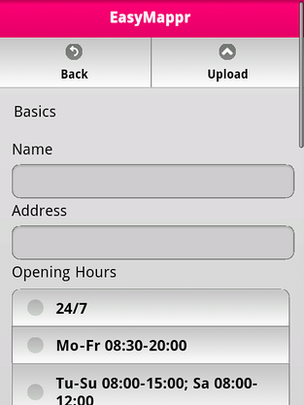
EasyMappr lets small shops and kiosks have information like opening times added to OpenStreetMap
The Mapping Uganda project is the brainchild of NGO Fruits of Thought.
With its technology partner Mountbatten Ltd they go to universities across the country and hold mapping days, where students use two bespoke smartphone apps to gather location information. The results are uploaded to OpenStreetMap.
EasyMappr plots the position of businesses, recording details such as opening times. Geo Bucket tracks the longitude and latitude of a phone as it moves, allowing roads to be accurately mapped. Both are about to be made publicly available on smartphone platforms.
Mountbatten's Ketty Adoch says this will allow mass mapping of businesses, sanitation facilities and other landmarks.
"If this information is known it saves [local councils] a lot in planning."
Ultimately accurate maps can save lives, according to Mountbatten's developer David Ebukali.
"If aid agencies come to [rural areas] they may not know where the roads are.
"Having mapped the area with something like this means they can get the aid to places faster and more easily."